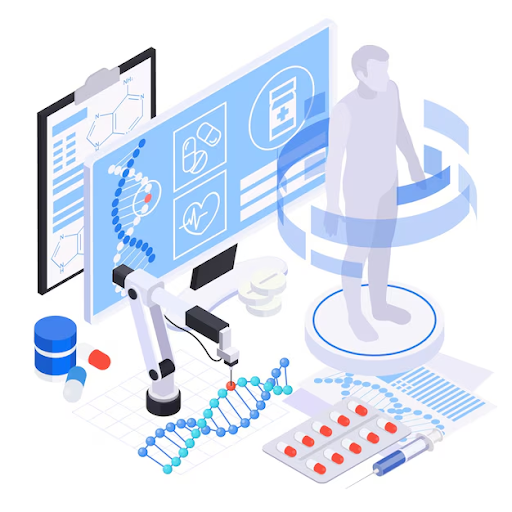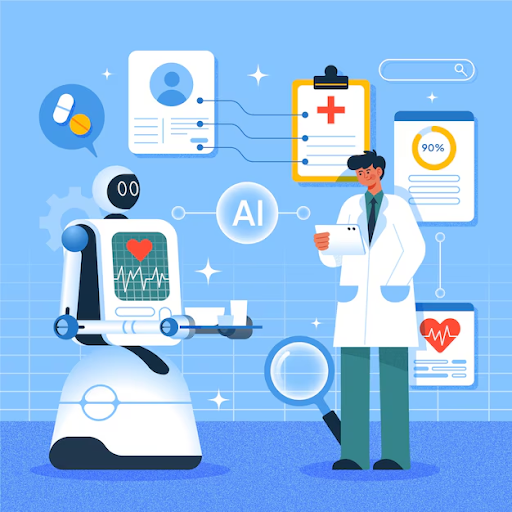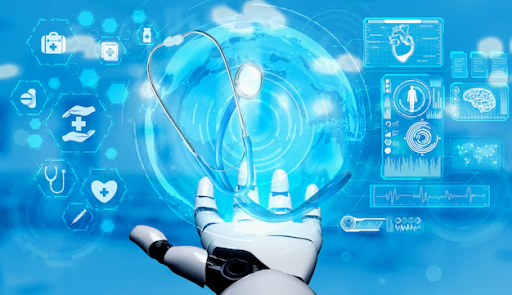AI brings unprecedented opportunities to improve cost-effectiveness and success rates in the research and development of new drugs. The adoption of artificial intelligence (AI) by the pharmaceutical industry marks a turning point in our journey towards improved health outcomes. With artificial intelligence, we have the opportunity to completely transform the pharmaceutical industry and usher in a new era of innovation, cost-effectiveness, and improved human health.
In this article, let's explore the current trends and future prospects of applying AI to fully harness the potential of the pharmaceutical industry.
1. Definition of Artificial Intelligence in Pharmaceuticals

Artificial intelligence (AI) in the pharmaceutical industry (pharma) involves the application of AI technologies and techniques to solve problems and improve processes in the field of pharmaceuticals.
Artificial intelligence (AI) in the pharmaceutical industry applies AI technologies to solve problems and improve processes in this field. Self-learning, a crucial factor of AI, is particularly well-suited for the pharmaceutical industry due to its continuous and ever-changing nature. The drug development process is very complex and lengthy, taking about 12-15 years and costing between 314 million to 4.46 billion dollars for each new drug. However, only 2 out of 10 drugs can generate enough revenue to cover the research and development costs.
The integration of AI faces several challenges such as data security, algorithmic bias, regulations, and ethical issues, requiring careful adjustments to maximize benefits and minimize risks.
With the rapid advancement of AI, the pharmaceutical industry has an unprecedented opportunity to change and innovate in ways never seen before. When harnessing the power of AI, pharmaceutical companies can discover drugs faster and improve treatment outcomes for patients. With the continuous development of AI, the future of the pharmaceutical industry is opening up bright prospects.
2. The importance of artificial intelligence in pharmaceuticals

Enhancing the effectiveness of research and development (R&D)
AI can analyze large data sets quickly and accurately, helping to identify potential compounds, predict the efficacy and safety of drugs before conducting clinical trials. AI algorithms, such as machine learning, can detect patterns in data that are difficult for humans to recognize, thereby helping to identify new drugs more quickly.
Reduce the cost and time of drug development
The development of new drugs often takes a lot of time and cost. AI can shorten this process by optimizing the stages from compound screening, drug formulation optimization to clinical trial design. AI tools can simulate biological reactions, minimize the number of animal tests, and increase the accuracy of experiments.
Personalized treatment
AI assists in personalizing treatment by analyzing patients' medical data, thereby proposing optimal treatment regimens. Through the analysis of health records, genetic data, and other factors, AI can help predict how each patient will respond to medication and treatment, thereby reducing side effects and increasing treatment efficacy.
Predicting side effects and drug interactions
AI can detect potential side effects and interactions between different drugs before they occur in clinical trials, helping to reduce risks for patients. Machine learning models can analyze data from clinical trials and patient records to predict these risks more accurately.
Support in pharmaceutical production management
AI also helps optimize the drug manufacturing process by monitoring and analyzing data from production facilities, enabling the early detection of errors in the manufacturing process. This helps improve the quality of the medicine and reduce material waste.
Enhance marketing and drug distribution
In the field of marketing, AI can analyze market data, health trends, and consumer behavior to determine the most effective ways to distribute and market drugs. AI can also help pharmaceutical companies optimize their marketing strategies based on big data analysis.
Addressing issues of drug resistance
AI can assist in researching and developing new types of drugs to address issues such as drug resistance, especially in the treatment of infectious diseases. AI systems can analyze bacterial or viral samples and help develop more effective antibiotics or vaccines.
3. Application of Artificial Intelligence in the Pharmaceutical Industry

Optimizing clinical trials is another area where AI has a significant impact. By harnessing the power of machine learning, AI can effectively identify suitable participants for clinical trials by matching them with a complex set of eligibility criteria.
Artificial intelligence (AI) is increasingly being widely applied in the pharmaceutical and healthcare industries, contributing to the improvement of drug research and development processes and the optimization of healthcare. Some notable applications of AI in pharmaceuticals include:
Drug discovery and development:
- Drug target discovery: AI can analyze genetic, protein, and pathological data to identify potential drug targets. This helps quickly identify new mechanisms of action in the treatment of diseases.
- Optimizing drug design: AI helps predict the chemical structure of compounds that can effectively target treatment goals, reducing testing time and research costs.
- Simulating the drug development process: AI models can simulate how drugs interact with the human body, helping to predict side effects and treatment efficacy, thereby minimizing risks in clinical trials.
Big Data Analysis:
AI has the ability to analyze large amounts of medical data, from clinical studies to patient information, to draw connections and trends that help make drug research and development more effective.
Predicting drug side effects:
AI systems can analyze clinical and pharmacological data to detect potential drug side effects, thereby assisting health authorities in monitoring and warning.
Personalized medicine:
AI supports the development of personalized treatment methods by analyzing patients' genetic and medical data, thereby optimizing the most suitable treatment methods for each individual, helping to increase effectiveness and minimize side effects.
Supply chain and pharmaceutical distribution management:
AI helps predict demand, optimize inventory management, and monitor the production and distribution processes of drugs, ensuring that medications reach patients efficiently.
Optimizing clinical trials:
AI can analyze and select suitable patient groups for clinical trials, helping to reduce costs and the time required for the trials, while also increasing the accuracy of the results.
Diagnosis:
AI assists in analyzing medical images such as X-rays, MRIs, and CT scans to detect early signs of disease, helping doctors make timely treatment decisions.
4. Challenges and limitations of artificial intelligence in the pharmaceutical industry

Quality and completeness of the data
Challenge: AI in pharmaceuticals heavily relies on data to build predictive models. However, the quality of the data can be inconsistent, incomplete, or noisy, especially in clinical trials, making AI models inaccurate and ineffective.
Limitation: Non-standardized data and difficulty in collecting from various sources can affect the reliability of AI results.
The issue of transparency and explanation
Challenge: AI models, especially deep learning, often operate like "black boxes," making it difficult to explain how they make decisions.
Limitation: In pharmaceuticals, the lack of interpretability of AI decisions can lead to non-acceptance in clinical testing and approval processes, as regulatory agencies require transparency regarding the scientific basis of decisions.
Compatibility and integration with the current system
Challenge: Many systems in the pharmaceutical industry still use traditional technology and are not well compatible with new AI solutions. This makes it difficult to integrate AI into processes such as research, drug development, and manufacturing.
Limitation: This integration requires significant changes to the technology infrastructure, making it costly and complex for pharmaceutical companies.
Issues related to security and privacy
Challenge: AI requires the use of large amounts of patient data and personal information to train and develop models. This raises significant issues regarding data security and privacy.
Limitations: Strict security regulations, such as GDPR in Europe, may restrict the ability to use personal data for training AI in the pharmaceutical industry.
Lack of knowledge and workforce training
Challenge: AI in pharmaceuticals requires a highly skilled workforce, proficient in both medicine and pharmaceuticals, as well as in AI technology.
Limitation: The lack of skilled personnel with deep expertise and understanding in both fields can slow down the process of AI adoption in the industry.
The approval process is strict and lengthy.
Challenge: AI-based drugs and medical devices must undergo a very rigorous testing and approval process by regulatory agencies, such as the FDA or EMA.
Limitations: This process can be prolonged, slowing down the time to market and restricting rapid innovation and creativity in the pharmaceutical industry.
Risk of bias in the model
Challenge: If the training data does not adequately represent all groups of people (e.g., different ethnic groups, genders), AI models may produce biased results, leading to unfair treatment of certain patient groups.
Limitation: Bias in AI can reduce the accuracy and effectiveness of AI solutions, especially in healthcare, where every decision is very important.
Uncertainty in testing and deployment
Challenge: Although AI can help accelerate the process of drug research and development, the results of clinical trials and real-world deployment can sometimes still be unpredictable due to the complexity of the human body.
Limitation: This may cause pharmaceutical companies to fail in applying AI to research or not achieve the desired results.
Investment costs and resources
Challenge: Although AI can bring long-term benefits, the initial costs of developing, deploying, and maintaining AI systems in pharmaceuticals are very high.
Limitations: Small companies or organizations without sufficient resources may face difficulties in implementing AI technology into their operations.
The rapid changes in technology
Challenge: AI technology is changing very rapidly, and today's solutions can become outdated in a short period of time.
Limitation: Pharmaceutical companies must continuously invest in research and development to keep up with these changes, which can make it difficult for them to maintain competitiveness.
5. The future prospects of artificial intelligence in pharmaceuticals

Artificial intelligence (AI) is increasingly becoming an important part of the pharmaceutical industry, and its future prospects are very promising. AI has the potential to improve efficiency, reduce costs and time in drug research and development, as well as optimize production and distribution processes. Here are some potential areas where AI can develop in the pharmaceutical industry:
Accelerating drug research and development: AI can help analyze and predict chemical compounds that have the potential to become effective treatments. Machine learning models can analyze millions of biological and chemical data to identify new pharmacological targets, helping to shorten the drug development process from many years to just a few months.
- Drug discovery: AI can predict the molecular structure and pharmacological properties of compounds, thereby assisting scientists in discovering compounds that have the potential to treat diseases for which there are currently no medications. Even, AI can help predict the interactions between drugs and potential side effects.
- Clinical trials: AI can optimize the clinical trial process by analyzing patient data to identify the most suitable participant groups, predicting the drug's effectiveness for each patient group, and minimizing unnecessary trials.
- Personalized treatment (Precision medicine): AI can analyze patients' genetic and medical data to create personalized treatment plans, helping to optimize treatment effectiveness and minimize side effects.
- Pharmaceutical supply chain management: AI can predict drug demand, optimize production processes, distribution, and ensure that drugs reach patients more quickly and efficiently. This is especially important in dealing with pandemics or drug shortages.
- Health monitoring and chronic disease management: AI can assist in monitoring and managing chronic diseases by analyzing data from wearable devices, helping doctors track patients' conditions and adjust treatment methods as needed.
- Enhancing quality control and regulatory compliance: AI can help automate the process of drug quality inspection and monitor compliance with production and distribution regulations, ensuring that products reaching consumers are always safe and effective.
6. Conclusion
Overall, the application of artificial intelligence (AI) in the pharmaceutical industry is opening up tremendous opportunities, not only optimizing the drug development process but also promoting the research, production, and distribution of pharmaceuticals. AI has proven its ability to improve drug discovery efficiency, predict patient responses, and enhance treatment quality through personalized solutions. However, to fully harness the potential of AI, the pharmaceutical industry needs to face several major challenges, including data security issues, regulatory compliance, and training highly skilled professionals.
In the future, with the continuous advancement of technology and the collaboration between technology experts and the healthcare sector, AI will continue to play a key role in revolutionizing the pharmaceutical industry. The application of AI not only helps the pharmaceutical industry enhance accuracy and efficiency but also contributes to the creation of breakthrough treatment solutions, bringing practical benefits to public health. Contact us for consultation and to receive free materials on the latest technology trends.